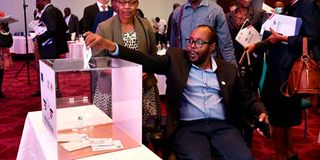The Unbounded God: How religion can be a tool for disability inclusion

National Council of Persons with Disabilities CEO Harun Hassan votes during the launch of Pro-Peace Kenya Project. Even with the constitutional right to religious faith, for persons with disabilities (PWDs), messages and attitudes around religion are heavy on discrimination instead of inclusivity.
Religion forms a big part of our identities. We participate in related activities and commemorations, bonding courtesy of our faiths. But even with the constitutional right to religious faith, for persons with disabilities (PWDs), messages and attitudes around religion are heavy on discrimination instead of inclusivity.
While the Constitution ascribes no state religion, the 2019 census shows 98 per cent of Kenyans are religious—with Christians the most, at 85 per cent, followed by Muslims (11 per cent). It is not a matter of mere identity but strong belief. A 2020 Pew Research Centre study shows 92 per cent of Kenyans assert that religion plays a crucial role in their lives. This presents religion as a crucial platform for addressing matters of stigma in disability.
“Oh God! Why did you let me have this disability?”, a study by Anthony Mugeere, shows PWDs, as the rest of the populace, put a lot of emphasis on religion as a source of identity, individuality, self-esteem and purpose in life. But the ‘disabling effect’ of religion is evident with respondents from Kenya, Uganda and Zambia outlining the barriers they have to go through to fully participate in worship.
No basic structures
Picture a PWD, like myself, leading a sermon, preaching the message of hope, peace and mercy to a congregation that wonders why he/she can’t begin by praying for him/herself! Not to mention the inaccessibility of the place of worship for lack of basic structures like ramps. A leading Nairobi mosque’s space for women to worship is upstairs. And the person is also harbouring difficult life-long questions about why they have to work harder to accomplish tasks others do easily.
Research shows the two extremes of religion and disability. First, PWDs are viewed as lesser human beings as compared to those without disabilities. It is also on this end that the ‘moral model’ of disability thrives, where it is viewed as punishment from God for a sin committed by the individual or their family. Secondly, religion is viewed as a tool of mercy and hope to assist PWDs in their socioeconomic status and integration into society.
‘Fearfully and wonderfully made’
Religious interpretations of disability speak highly of social inclusion. In Quran 49:13, God creates all of us differently and equal in His eyes with priority to one’s personal relationship with their God. My Christian friends tell me that we are all ‘fearfully and wonderfully made’ and that God’s works are wonderful.
With the high rate of piety in Kenya, religious institutions can play a key role in fighting myths and misconceptions about disability. On issues of morality, social inclusion and national affairs, religious leaders have influence on the citizenry’s perceptions on issues.
Recent instances include encouraging Kenyans to receive Covid-19 vaccines and peace prayer caravans in the run-up to the general election. Hence, the absence of a strong, unanimous voice among religious leaders on matters disability leaves a massive gap on progress in the disability movement. And, for a long time, players in the disability movement could have unintentionally not fully collaborated with religious groups on disability mainstreaming in places of worship.
Leadership opportunities
Religious institutions could give leadership opportunities to PWDs. The pictures of Pope Francis on a wheelchair for the first time in public last month due to a knee problem sent a strong message that his physical challenge could not hinder his ability to lead the largest Christian church of over 1.3 billion faithful.
Religious leaders can organise sermons on disability within the lens of religion, instilling that disability isn’t an act of God’s wrath but an eventuality that can befall any of us. But with the current scientific efforts to ‘control’ the ‘DNA Lottery’, there will definitely come a time when we will have less congenital disabilities and more acquired ones.
Disability organisations can also partner with religious institutions to sensitise the public on disability inclusion, challenging them to view PWDs not as people seeking pity but equal human beings with innate human rights. Religious organisations can also partner with the government and NGOs on disability medical assessments, registration drives and provision of assistive devices while celebrating our diversity as a people.
Mr Hassan is the CEO, National Council for Persons with Disabilities (NCPWD). [email protected] | [email protected].




